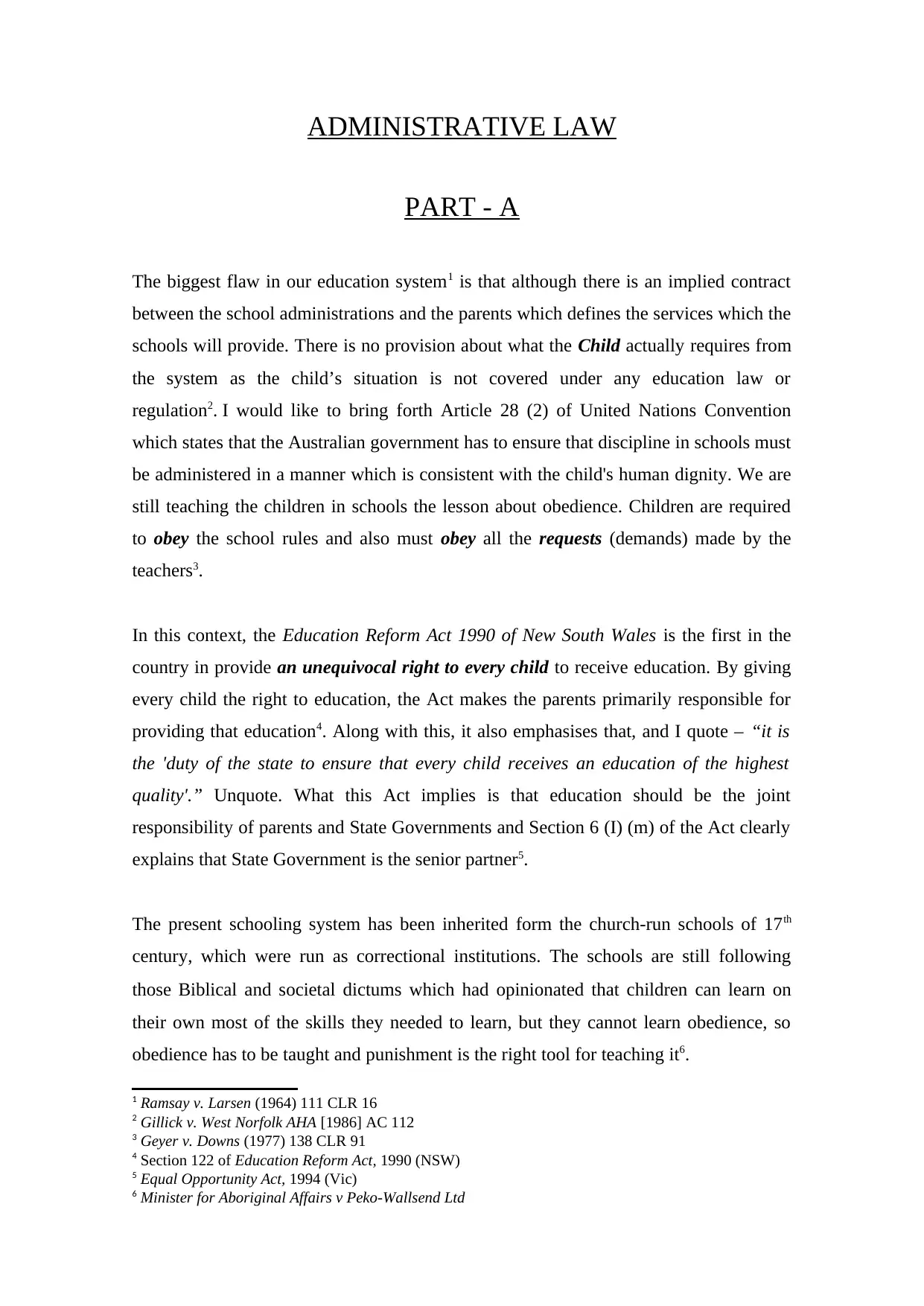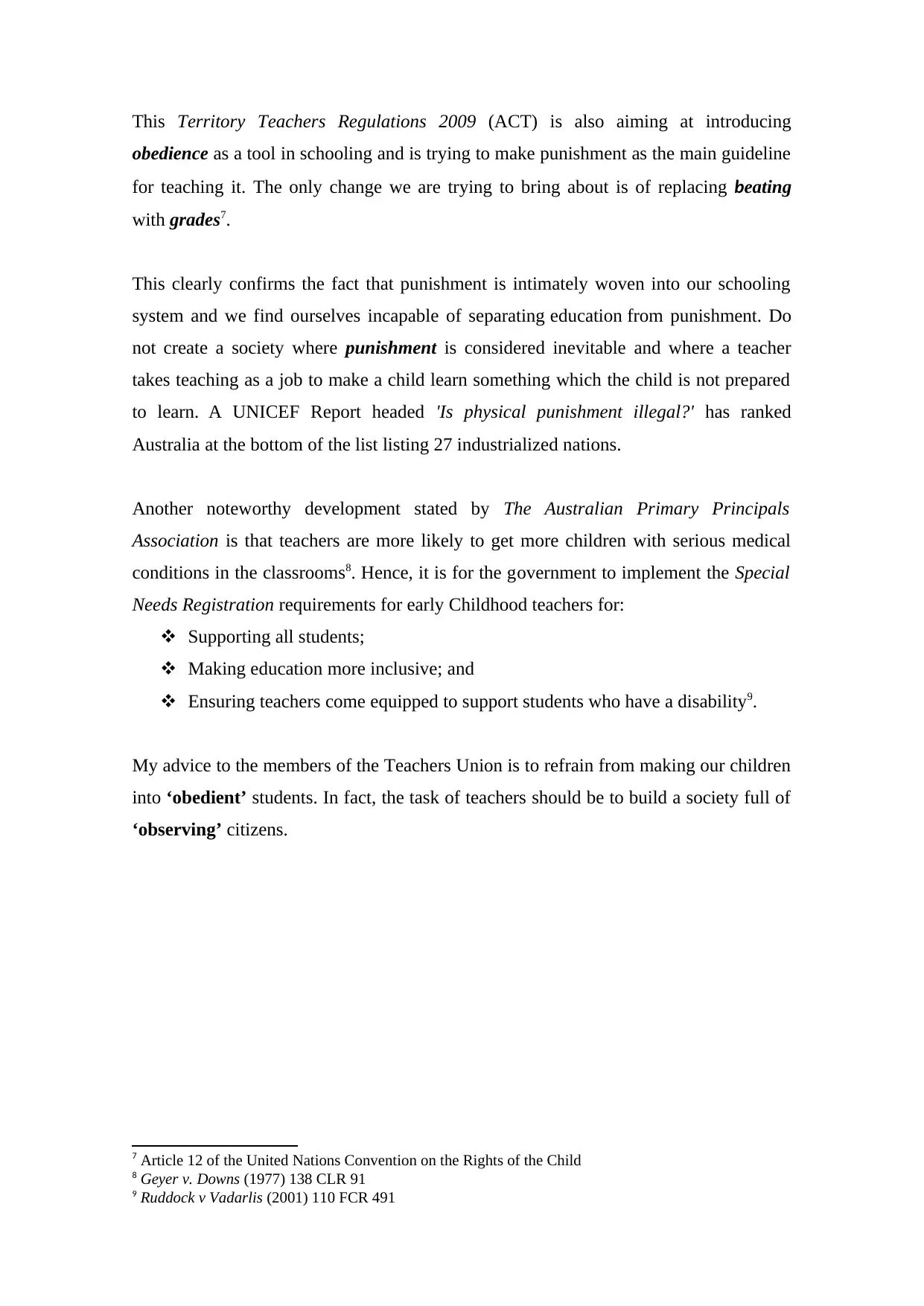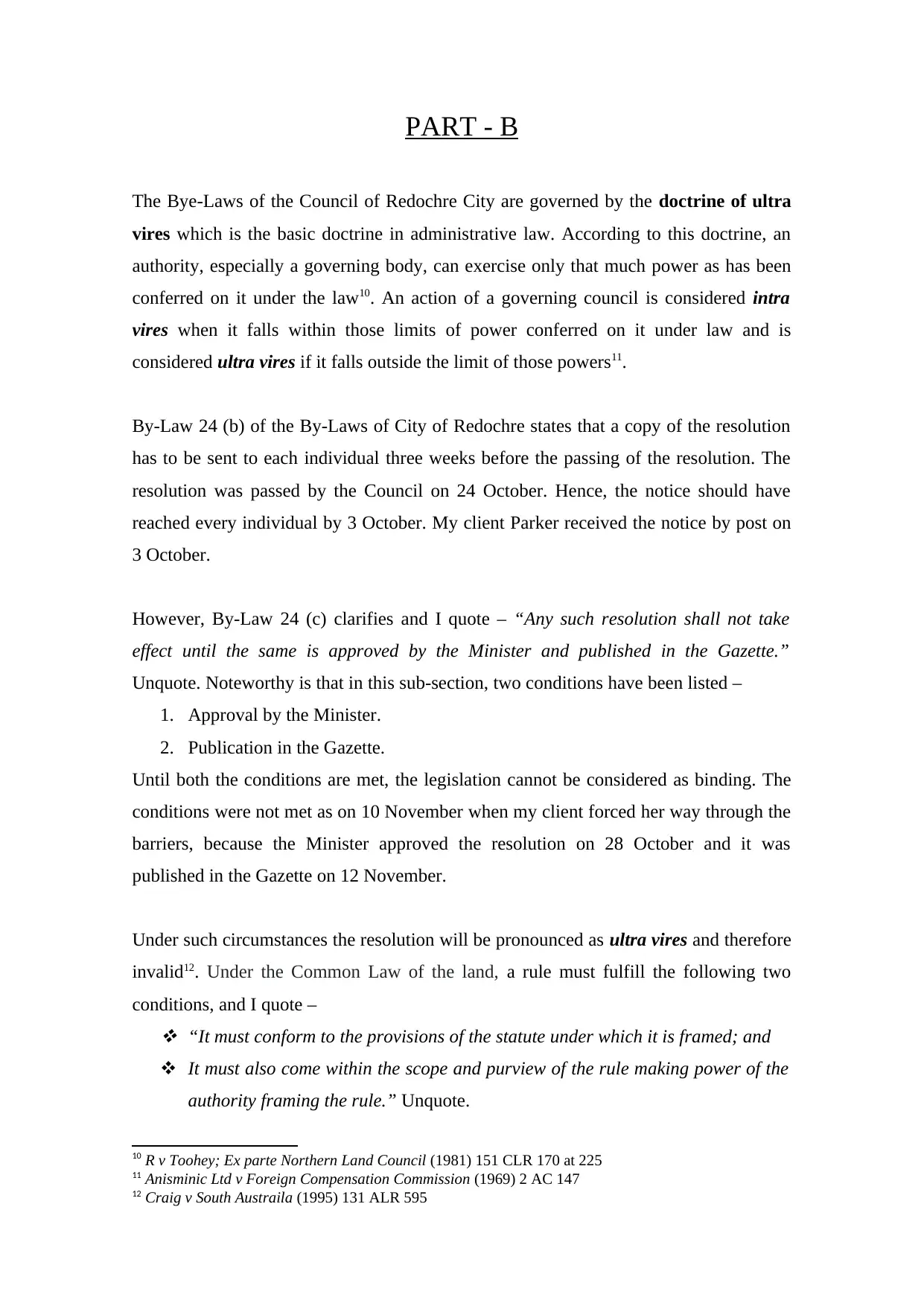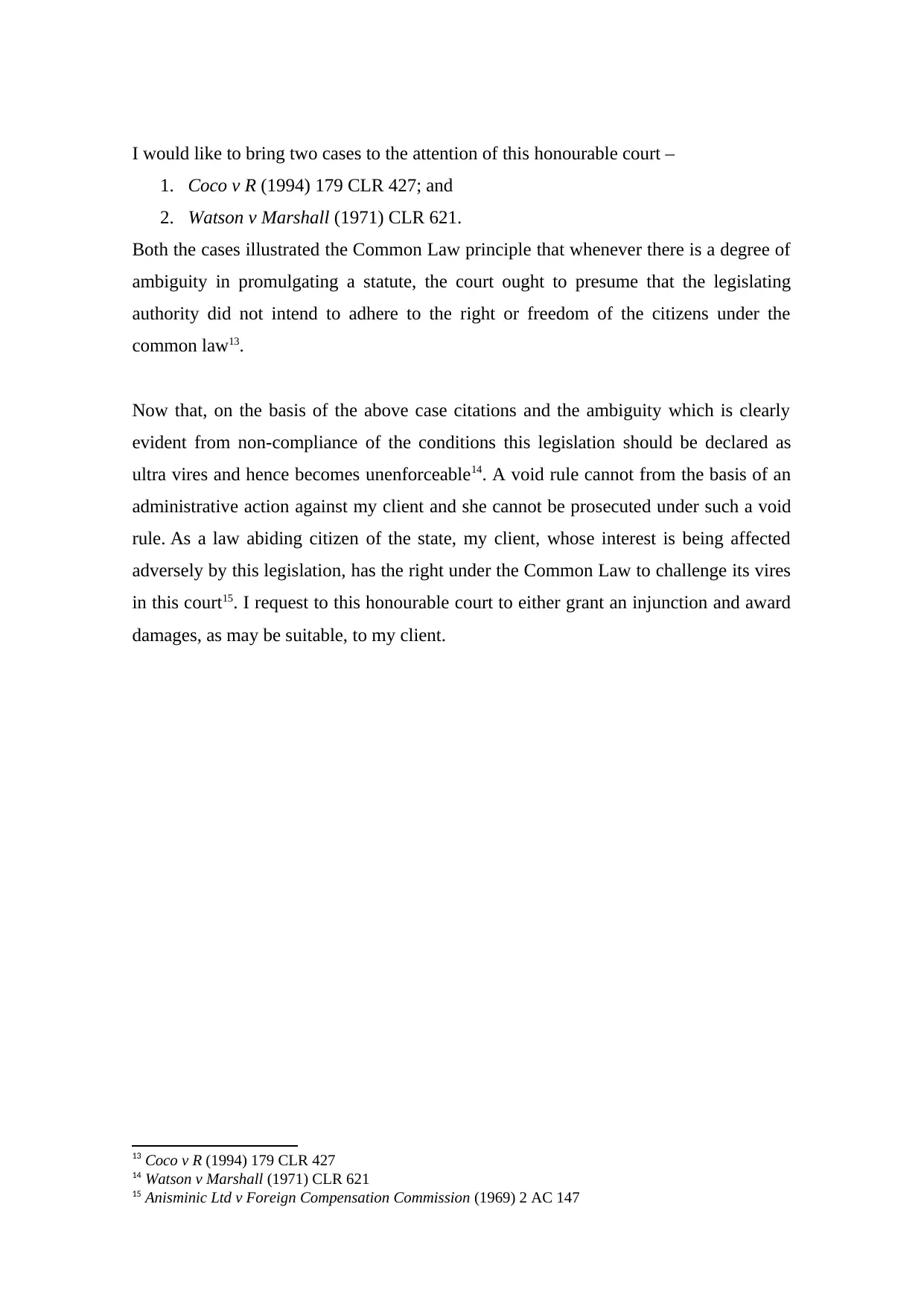Administrative Law Report: Education System and Council Bye-Laws
VerifiedAdded on 2021/05/31
|4
|1154
|59
Report
AI Summary
This report provides a comprehensive analysis of an administrative law case, addressing two primary areas: the flaws in the current education system and the legal challenges related to council bye-laws. Part A of the report critiques the education system, highlighting the lack of consideration for a child's individual needs and the emphasis on obedience over observation. It references the Education Reform Act 1990 of New South Wales and argues for a shift in the teacher's role to foster observing citizens rather than obedient students. Part B focuses on the application of the doctrine of ultra vires to the Bye-Laws of the Council of Redochre City, specifically addressing a case where a resolution was passed but did not adhere to the required procedures, including timely notice and ministerial approval. The report argues that, due to these procedural irregularities, the resolution should be deemed ultra vires and unenforceable, citing relevant case laws like Coco v R and Watson v Marshall, and asserting the client's right to challenge the legislation.

ADMINISTRATIVE LAW
PART - A
The biggest flaw in our education system1 is that although there is an implied contract
between the school administrations and the parents which defines the services which the
schools will provide. There is no provision about what the Child actually requires from
the system as the child’s situation is not covered under any education law or
regulation2. I would like to bring forth Article 28 (2) of United Nations Convention
which states that the Australian government has to ensure that discipline in schools must
be administered in a manner which is consistent with the child's human dignity. We are
still teaching the children in schools the lesson about obedience. Children are required
to obey the school rules and also must obey all the requests (demands) made by the
teachers3.
In this context, the Education Reform Act 1990 of New South Wales is the first in the
country in provide an unequivocal right to every child to receive education. By giving
every child the right to education, the Act makes the parents primarily responsible for
providing that education4. Along with this, it also emphasises that, and I quote – “it is
the 'duty of the state to ensure that every child receives an education of the highest
quality'.” Unquote. What this Act implies is that education should be the joint
responsibility of parents and State Governments and Section 6 (I) (m) of the Act clearly
explains that State Government is the senior partner5.
The present schooling system has been inherited form the church-run schools of 17th
century, which were run as correctional institutions. The schools are still following
those Biblical and societal dictums which had opinionated that children can learn on
their own most of the skills they needed to learn, but they cannot learn obedience, so
obedience has to be taught and punishment is the right tool for teaching it6.
1 Ramsay v. Larsen (1964) 111 CLR 16
2 Gillick v. West Norfolk AHA [1986] AC 112
3 Geyer v. Downs (1977) 138 CLR 91
4 Section 122 of Education Reform Act, 1990 (NSW)
5 Equal Opportunity Act, 1994 (Vic)
6 Minister for Aboriginal Affairs v Peko-Wallsend Ltd
PART - A
The biggest flaw in our education system1 is that although there is an implied contract
between the school administrations and the parents which defines the services which the
schools will provide. There is no provision about what the Child actually requires from
the system as the child’s situation is not covered under any education law or
regulation2. I would like to bring forth Article 28 (2) of United Nations Convention
which states that the Australian government has to ensure that discipline in schools must
be administered in a manner which is consistent with the child's human dignity. We are
still teaching the children in schools the lesson about obedience. Children are required
to obey the school rules and also must obey all the requests (demands) made by the
teachers3.
In this context, the Education Reform Act 1990 of New South Wales is the first in the
country in provide an unequivocal right to every child to receive education. By giving
every child the right to education, the Act makes the parents primarily responsible for
providing that education4. Along with this, it also emphasises that, and I quote – “it is
the 'duty of the state to ensure that every child receives an education of the highest
quality'.” Unquote. What this Act implies is that education should be the joint
responsibility of parents and State Governments and Section 6 (I) (m) of the Act clearly
explains that State Government is the senior partner5.
The present schooling system has been inherited form the church-run schools of 17th
century, which were run as correctional institutions. The schools are still following
those Biblical and societal dictums which had opinionated that children can learn on
their own most of the skills they needed to learn, but they cannot learn obedience, so
obedience has to be taught and punishment is the right tool for teaching it6.
1 Ramsay v. Larsen (1964) 111 CLR 16
2 Gillick v. West Norfolk AHA [1986] AC 112
3 Geyer v. Downs (1977) 138 CLR 91
4 Section 122 of Education Reform Act, 1990 (NSW)
5 Equal Opportunity Act, 1994 (Vic)
6 Minister for Aboriginal Affairs v Peko-Wallsend Ltd
Paraphrase This Document
Need a fresh take? Get an instant paraphrase of this document with our AI Paraphraser

This Territory Teachers Regulations 2009 (ACT) is also aiming at introducing
obedience as a tool in schooling and is trying to make punishment as the main guideline
for teaching it. The only change we are trying to bring about is of replacing beating
with grades7.
This clearly confirms the fact that punishment is intimately woven into our schooling
system and we find ourselves incapable of separating education from punishment. Do
not create a society where punishment is considered inevitable and where a teacher
takes teaching as a job to make a child learn something which the child is not prepared
to learn. A UNICEF Report headed 'Is physical punishment illegal?' has ranked
Australia at the bottom of the list listing 27 industrialized nations.
Another noteworthy development stated by The Australian Primary Principals
Association is that teachers are more likely to get more children with serious medical
conditions in the classrooms8. Hence, it is for the government to implement the Special
Needs Registration requirements for early Childhood teachers for:
Supporting all students;
Making education more inclusive; and
Ensuring teachers come equipped to support students who have a disability9.
My advice to the members of the Teachers Union is to refrain from making our children
into ‘obedient’ students. In fact, the task of teachers should be to build a society full of
‘observing’ citizens.
7 Article 12 of the United Nations Convention on the Rights of the Child
8 Geyer v. Downs (1977) 138 CLR 91
9 Ruddock v Vadarlis (2001) 110 FCR 491
obedience as a tool in schooling and is trying to make punishment as the main guideline
for teaching it. The only change we are trying to bring about is of replacing beating
with grades7.
This clearly confirms the fact that punishment is intimately woven into our schooling
system and we find ourselves incapable of separating education from punishment. Do
not create a society where punishment is considered inevitable and where a teacher
takes teaching as a job to make a child learn something which the child is not prepared
to learn. A UNICEF Report headed 'Is physical punishment illegal?' has ranked
Australia at the bottom of the list listing 27 industrialized nations.
Another noteworthy development stated by The Australian Primary Principals
Association is that teachers are more likely to get more children with serious medical
conditions in the classrooms8. Hence, it is for the government to implement the Special
Needs Registration requirements for early Childhood teachers for:
Supporting all students;
Making education more inclusive; and
Ensuring teachers come equipped to support students who have a disability9.
My advice to the members of the Teachers Union is to refrain from making our children
into ‘obedient’ students. In fact, the task of teachers should be to build a society full of
‘observing’ citizens.
7 Article 12 of the United Nations Convention on the Rights of the Child
8 Geyer v. Downs (1977) 138 CLR 91
9 Ruddock v Vadarlis (2001) 110 FCR 491

PART - B
The Bye-Laws of the Council of Redochre City are governed by the doctrine of ultra
vires which is the basic doctrine in administrative law. According to this doctrine, an
authority, especially a governing body, can exercise only that much power as has been
conferred on it under the law10. An action of a governing council is considered intra
vires when it falls within those limits of power conferred on it under law and is
considered ultra vires if it falls outside the limit of those powers11.
By-Law 24 (b) of the By-Laws of City of Redochre states that a copy of the resolution
has to be sent to each individual three weeks before the passing of the resolution. The
resolution was passed by the Council on 24 October. Hence, the notice should have
reached every individual by 3 October. My client Parker received the notice by post on
3 October.
However, By-Law 24 (c) clarifies and I quote – “Any such resolution shall not take
effect until the same is approved by the Minister and published in the Gazette.”
Unquote. Noteworthy is that in this sub-section, two conditions have been listed –
1. Approval by the Minister.
2. Publication in the Gazette.
Until both the conditions are met, the legislation cannot be considered as binding. The
conditions were not met as on 10 November when my client forced her way through the
barriers, because the Minister approved the resolution on 28 October and it was
published in the Gazette on 12 November.
Under such circumstances the resolution will be pronounced as ultra vires and therefore
invalid12. Under the Common Law of the land, a rule must fulfill the following two
conditions, and I quote –
“It must conform to the provisions of the statute under which it is framed; and
It must also come within the scope and purview of the rule making power of the
authority framing the rule.” Unquote.
10 R v Toohey; Ex parte Northern Land Council (1981) 151 CLR 170 at 225
11 Anisminic Ltd v Foreign Compensation Commission (1969) 2 AC 147
12 Craig v South Austraila (1995) 131 ALR 595
The Bye-Laws of the Council of Redochre City are governed by the doctrine of ultra
vires which is the basic doctrine in administrative law. According to this doctrine, an
authority, especially a governing body, can exercise only that much power as has been
conferred on it under the law10. An action of a governing council is considered intra
vires when it falls within those limits of power conferred on it under law and is
considered ultra vires if it falls outside the limit of those powers11.
By-Law 24 (b) of the By-Laws of City of Redochre states that a copy of the resolution
has to be sent to each individual three weeks before the passing of the resolution. The
resolution was passed by the Council on 24 October. Hence, the notice should have
reached every individual by 3 October. My client Parker received the notice by post on
3 October.
However, By-Law 24 (c) clarifies and I quote – “Any such resolution shall not take
effect until the same is approved by the Minister and published in the Gazette.”
Unquote. Noteworthy is that in this sub-section, two conditions have been listed –
1. Approval by the Minister.
2. Publication in the Gazette.
Until both the conditions are met, the legislation cannot be considered as binding. The
conditions were not met as on 10 November when my client forced her way through the
barriers, because the Minister approved the resolution on 28 October and it was
published in the Gazette on 12 November.
Under such circumstances the resolution will be pronounced as ultra vires and therefore
invalid12. Under the Common Law of the land, a rule must fulfill the following two
conditions, and I quote –
“It must conform to the provisions of the statute under which it is framed; and
It must also come within the scope and purview of the rule making power of the
authority framing the rule.” Unquote.
10 R v Toohey; Ex parte Northern Land Council (1981) 151 CLR 170 at 225
11 Anisminic Ltd v Foreign Compensation Commission (1969) 2 AC 147
12 Craig v South Austraila (1995) 131 ALR 595
⊘ This is a preview!⊘
Do you want full access?
Subscribe today to unlock all pages.

Trusted by 1+ million students worldwide

I would like to bring two cases to the attention of this honourable court –
1. Coco v R (1994) 179 CLR 427; and
2. Watson v Marshall (1971) CLR 621.
Both the cases illustrated the Common Law principle that whenever there is a degree of
ambiguity in promulgating a statute, the court ought to presume that the legislating
authority did not intend to adhere to the right or freedom of the citizens under the
common law13.
Now that, on the basis of the above case citations and the ambiguity which is clearly
evident from non-compliance of the conditions this legislation should be declared as
ultra vires and hence becomes unenforceable14. A void rule cannot from the basis of an
administrative action against my client and she cannot be prosecuted under such a void
rule. As a law abiding citizen of the state, my client, whose interest is being affected
adversely by this legislation, has the right under the Common Law to challenge its vires
in this court15. I request to this honourable court to either grant an injunction and award
damages, as may be suitable, to my client.
13 Coco v R (1994) 179 CLR 427
14 Watson v Marshall (1971) CLR 621
15 Anisminic Ltd v Foreign Compensation Commission (1969) 2 AC 147
1. Coco v R (1994) 179 CLR 427; and
2. Watson v Marshall (1971) CLR 621.
Both the cases illustrated the Common Law principle that whenever there is a degree of
ambiguity in promulgating a statute, the court ought to presume that the legislating
authority did not intend to adhere to the right or freedom of the citizens under the
common law13.
Now that, on the basis of the above case citations and the ambiguity which is clearly
evident from non-compliance of the conditions this legislation should be declared as
ultra vires and hence becomes unenforceable14. A void rule cannot from the basis of an
administrative action against my client and she cannot be prosecuted under such a void
rule. As a law abiding citizen of the state, my client, whose interest is being affected
adversely by this legislation, has the right under the Common Law to challenge its vires
in this court15. I request to this honourable court to either grant an injunction and award
damages, as may be suitable, to my client.
13 Coco v R (1994) 179 CLR 427
14 Watson v Marshall (1971) CLR 621
15 Anisminic Ltd v Foreign Compensation Commission (1969) 2 AC 147
1 out of 4
Related Documents
Your All-in-One AI-Powered Toolkit for Academic Success.
+13062052269
info@desklib.com
Available 24*7 on WhatsApp / Email
![[object Object]](/_next/static/media/star-bottom.7253800d.svg)
Unlock your academic potential
Copyright © 2020–2026 A2Z Services. All Rights Reserved. Developed and managed by ZUCOL.





